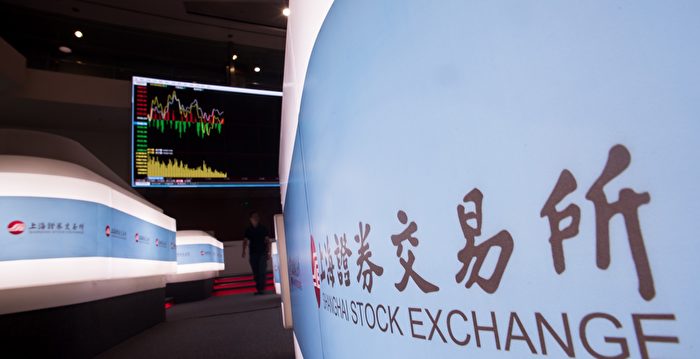[Epoch Times September 10, 2021](Epoch Times reporter Lin Yan comprehensive report) Why is Beijing welcoming U.S. securities companies to operate in China, but it continues to push the relationship between China and the United States into a new abyss, Wall Street Journal reporter Jacky Wong replied that the answer is simple. This move is in the interests of China (the CCP).
The CCP has long imposed strict controls on the financial industry and has placed many barriers on foreign asset management companies. However, in early 2020, according to the first phase of the trade agreement signed between China and the United States, the Chinese Communist government lifted restrictions on US asset management companies’ issuance of public funds to Chinese retail investors.
BlackRock, the world‘s largest fund management company, was approved by the Chinese Communist Party’s regulatory authorities in June 2021, becoming the first company to be fully approved to sell its own public fund products to Chinese retail investors. So far, BlackRock is still the only foreign company approved.
It is expected that more American companies will soon follow BlackRock and go to China to raise funds. Fidelity International has received preliminary approval from the Chinese Communist Party in August, and Neuberger Berman and Vaneck are also applying for licenses for their Chinese mutual fund business, and they are currently in the process of going through the process.
Beijing’s abacus borrows foreign capital to revitalize the stock and bond markets
BlackRock manages approximately US$9.5 trillion in funds and has been operating in China for more than 10 years. After 17 months of regulatory approval process, this is called “BlackRock China New Horizon Mixed Securities Investment Fund” (BlackRock China New Horizon Mixed Securities Investment Fund, referred to as BlackRock China New Horizon Mixed Securities Investment Fund) within 5 days More than 111,000 Chinese individual investors were raised.
The fund said that 60% to 95% of its assets will be allocated to stocks and depositary receipts in China’s new energy, consumption, digital economy, healthcare, education, and advanced manufacturing sectors.
Industry insiders believe that Beijing’s move is to use foreign capital to revitalize China’s stock and bond markets. “The participation of BlackRock and other companies (in the Chinese market) can help gain the trust of domestic investors and transfer Chinese household savings from real estate. The Chinese government hopes to transfer the economy from real estate,” Jack wrote.
He said that Beijing has long hoped that the capital market will play a greater role in China. As the Chinese Communist government becomes more vigilant about relying on the US stock market, this issue has become more urgent.
Chinese companies rely mainly on bank loans and retained profits for investment, which is very different from many other major economies.
According to statistics from data provider Wind, about 60% of the total outstanding social financing comes from bank loans, and only about 12% of corporate bonds and equity from non-financial companies. Compared with US data, 73% of funds are provided for non-financial companies’ stocks and bonds.
On the other hand, the monopoly of the Chinese Communist Party’s state-owned banks over the financial system makes it more difficult for unrelated small companies to obtain long-term development funds, even if they have innovative and good business models. This deadlock can be broken through foreign investment management companies.
In addition to opening up finance to foreign companies, the CCP has also opened up channels for investors from outside China to go to China. According to data provided by the People’s Bank of China through Wind, as of June, foreign investors, including Hong Kong investors, now hold 7.6 trillion yuan (equivalent to 1.2 trillion US dollars) of Chinese domestic stocks and bonds. This number is four times that of four years ago, and such inflows can help offset capital outflows from Chinese investors.

BlackRock takes the lead in calling for investment in China
In addition, foreign investment management companies believe that China’s growing middle class can provide a lot of untapped opportunities. BlackRock’s internal think tank publicly recommended in August that global investors should triple their allocation of Chinese assets.
BlackRock Chairman and CEO Larry Fink wrote in a letter to shareholders: “The Chinese market represents an important opportunity to help achieve the long-term goals of Chinese and international investors. “
However, BlackRock’s call to invest in China has met with rare refutations from investment tycoons. George Soros, a veteran hedge fund manager and supporter of the Democratic Party and President Biden, has recently criticized BlackRock’s investment stance in China.
Soros’s latest review article published on China Day on the 6th said that BlackRock’s investment in China is a “tragic mistake” that may harm BlackRock’s customers and harm the United States and other democracies. National security interests.
Soros said: “Earlier (American investors invested in China) efforts, you can say that you are building a bridge for closer relations between the two countries, then it is also morally reasonable, but now the situation is completely different. Today, The United States and China are in a life-and-death battle between the two governance systems of autocracy and democracy.”
Dan Harris, a partner and attorney of the American international law firm Harris Bricken (Harris Bricken), attended the hearing of the US-China Economic and Security Review Commission (USCC), a permanent body of Congress on Wednesday (8th) Shi said that the CCP’s aversion to private enterprises is inherent, and the prerequisite for their economic development and investment is that they must help preserve power and maintain the party’s survival.
“China cares about foreign investment and its own economy, but only these (behaviors) support the power of the CCP and help ensure (the party’s) survival will happen,” he said.
Analyst: BlackRock is betting on China’s economy and US-China political risks
Jack said that BlackRock has bet a lot of chips on Chinese individual investors’ desire for professional asset management, and at the same time bet on the controversial political risks in Sino-US relations.
“Wall Street has always been a rare winner in the tension between the United States and China. Obviously Wall Street is now on the line. If Washington and Beijing stand still on this special battlefield and the Chinese stock market will recover from the current blow, BlackRock may A big win; if it weren’t the case, (BlackRock’s) loss could have been huge,” he said.
At present, the United States and China still have fierce differences on trade, technology, South China Sea, Xinjiang, and national security issues.
Because of the Chinese authorities’ suppression of companies in industries including technology and education, those American investors who have bought stocks in overseas Chinese companies are currently in the stage of deep healing.
The escalating tensions between the two countries are also accelerating the broader financial decoupling between the United States and China. The Chinese Communist government has stated that it will tighten regulations on companies listed in the United States, and US regulators require Chinese companies listed in the United States to undergo more scrutiny.
“Under this kind of cold war-like environment, American companies trying to expand in China may be accused by the political and investment circles as anti-American.” The report before Huari said. “However, attracted by the huge profits and growth prospects of the Chinese market, American companies will not stop because of this.”
Attorney Harris also told USCC that some foreign investors do not know the situation in China; many others do, but for reasons of interest, they do not want others to know.
“I say this because when our company’s lawyers write about China’s criticism, foreign (business) people in China often tell us that they want us not to do this, because our article may encourage their company. Withdrawal from China, they may lose their jobs. Few businessmen have the motivation to tell the truth about China.” He said.
Editor in charge: Ye Ziwei#
.
